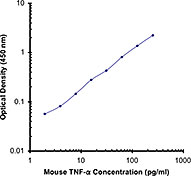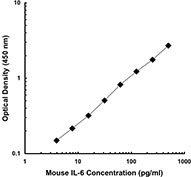- Regulatory Status
- RUO
- Other Names
- Tumor necrosis factor-α, Cachectin, Necrosin, Macrophage cytotoxic factor (MCF), Differentiation inducing factor (DIF), TNFSF-2
- Ave. Rating
- Submit a Review
- Product Citations
- publications
| Cat # | Size | Price | Quantity Check Availability | Save | ||
|---|---|---|---|---|---|---|
| 575209 | 4 pack | 76€ | ||||
TNF-α is secreted by macrophages, monocytes, neutrophils, T-cells (principally CD4+), and NK-cells. Many transformed cell lines also secrete TNF-α. Monomeric mouse TNF-α is 156 amino acid protein (N-glycosylated) with a reported molecular weight of 17.5 kD protein. TNF-α forms multimeric complexes; stable trimers are most common in solution. A 26 kD membrane form of TNF-α has also been described. TNF-α binding to surface receptors elicits a wide array of biologic activities including: cytolysis and cytostasis of many tumor cell lines in vitro, hemorraghic necrosis of tumors in vivo, increased fibroblast proliferation, and enhanced chemotaxis and phagocytosis in neutrophils.TNF-α is secreted by macrophages, monocytes, neutrophils, T-cells (principally CD4+), and NK-cells. Many transformed cell lines also secrete TNF-α. Monomeric mouse TNF-α is 156 amino acid protein (N-glycosylated) with a reported molecular weight of 17.5 kD protein. TNF-α forms multimeric complexes; stable trimers are most common in solution. A 26 kD membrane form of TNF-α has also been described. TNF-α binding to surface receptors elicits a wide array of biologic activities including: cytolysis and cytostasis of many tumor cell lines in vitro, hemorraghic necrosis of tumors in vivo, increased fibroblast proliferation, and enhanced chemotaxis and phagocytosis in neutrophils.
Product DetailsProduct Details
- Source
- Mouse TNF-α, amino acids Leu 80-Leu 235 (Accession # NM_013693) was expressed in E. coli.
- Molecular Mass
- The 156 amino acid protein has a predicted molecular mass of 17,257 Da. The DTT-reduced and non-reduced protein migrates at approximately 16 kDa by SDS-PAGE. The N-terminal amino acid is Leu.
- Purity
- Purity is >98% as determined by SDS PAGE , Coomassie stained with Invitrogen SimplyBlue SafeStain.
- Formulation
- Lyophilized in sterile-filtered PBS, pH 7.2, containing 1% BSA, 0.09% sodium azide, and protease inhibitors.
- Concentration
- Lot-specific (to obtain lot-specific concentration and expiration, please enter the lot number in our Certificate of Analysis online tool.)
- Storage & Handling
- Unopened vials can be stored between 2°C and 8°C until the expiration date. Prior to use, reconstitute the lyophilized powder with 0.2 mL of PBS containing a carrier protein (e.g., 1% BSA, protease free), pH7.4. Re-cap vial, vortex. Allow the reconstituted standard to sit at room temperature for 15 minutes, vortex again to mix completely. The reconstituted standard stock solution can be aliquoted into polypropylene vials and stored at -70°C for up to one month. Do not re-use diluted standards. Avoid repeated freeze/thaw cycles.
- Application
-
ELISA - Quality tested
- Recommended Usage
-
Each lot of this protein is quality control tested by ELISA assay. For use as an ELISA standard, a standard curve comprised of doubling dilutions from 500 pg/ml to 4 pg/ml is suggested. It is recommended that the reagent be titrated for optimal performance for each application.
- Application Notes
-
This TNF-a protein is useful as a standard for a mouse TNF-a sandwich ELISA, using unlabelled 6B8 antibody (Cat. No. 510801) as capture and biotinylated MP6-XT22 antibody (Cat. No. 506311) as detection or unlabelled TN3-19.12 antibody (Cat. No. 506102) for capture and biotinylated Poly5160 antibody (Cat. No. 516003) for detection.
- Product Citations
-
Antigen Details
- Structure
- TNF superfamily; dimer/trimer
- Distribution
-
Activated monocytes, neutrophils, macrophages, T cells, B cells, NK cells, LAK cells
- Function
- Type II integral membrane protein processed by TACE for secretion; upregulated by interferons, IL-2, GM-CSF, substance P, bradykinin, PAF, immune complexes, cyclooxygenase; downregulated by IL-6, TGF-β, vitamin D3, prostaglandin E2, PAF antagonists
- Interaction
- Monocytes, neutrophils, macrophages, T cells, fibroblasts, endothelial cells, osteoclasts, adipocytes, astroglia, microglia
- Ligand/Receptor
- TNFRSF1A (TNF-R1, CD120a, TNFR-p60 Type β, p55); TNFRSF1B (TNF-R2, CD120b, TNFR-p80 Type A, p75)
- Bioactivity
- Paracrine/endocrine mediator of inflammatory and immune functions; selectively cytotoxic for transformed cells; endothelial cell alterations; chemoattractant
- Biology Area
- Cell Biology, Immunology, Innate Immunity, Neuroinflammation, Neuroscience
- Molecular Family
- Cytokines/Chemokines
- Antigen References
-
1. Fitzgerald K, et al. Eds. 2001. The Cytokine FactsBook. Academic Press San Diego.
2. Beutler B, et al. 1988. Annu. Rev. Biochem. 57:505.
3. Beutler B, et al. 1989. Annu. Rev. Immunol. 7:625.
4. Tracey K, et al. 1993. Crit. Care Med. 21:S415. - Gene ID
- 21926 View all products for this Gene ID
- UniProt
- View information about TNF-alpha on UniProt.org
Related FAQs
Customers Also Purchased



 Login / Register
Login / Register 















Follow Us